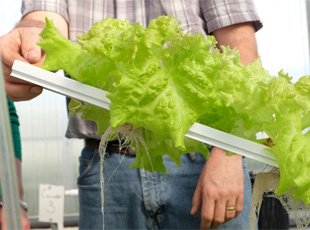North Stokes High School receives GAP certification
First GAP certified high school agriculture program in North Carolina lets North Stokes students grow food for school system
 Do you know where your lunch came from?
Do you know where your lunch came from?
Or who harvested it?
Or how it was grown?
When there’s lettuce on the menu at North Stokes High School, students know exactly where it came from. Some of them even helped grow it.
North Stokes has the first school farm in the state certified to serve its produce in the school’s cafeteria. Federal regulations require all produce served by schools come from producers with GAP certification – a standard of good agricultural practices set to ensure food safety. The school received its certification just last week and has already begun using its lettuce crop for lunches. Cafeteria Manager Bertha Amos said she used the first harvest in a salad mix last week.
“It makes a beautiful salad,” Amos said.
Hydroponically grown
The lettuce comes from the school’s hydroponic greenhouse. The plants are grown without soil, planted in a table that continuously circulates nutrient-rich water through the root system. From seed to harvest, the entire process is managed by students in the newly GAP certified greenhouse.
Bell Hall, North Stokes agriculture teacher, said he chose lettuce because it’s relatively easy to grow, his classes can produce a large enough volume to use in the cafeteria and it goes from seed to harvest fast enough (about two months) for students to see the entire process in a semester. In the hydroponic greenhouse, Hall has two lettuce tables, plus tomato and cucumber systems. Those take longer, he said, so students who start them won’t be the ones harvesting them.
The school’s 3,500 square foot outdoor garden of raised beds is just getting started. The beds, dotted with lettuce plants started by students in the greenhouse, have not yet received GAP certification but are expected to in time for its harvest to also appear on the menu this spring. Students had been waiting for better weather to get the lettuce plants the ground.
They found it Wednesday. Under noontime sun on the 80-degree day, students knelt in the mulch they’d spread earlier. With a gentle squeeze to release starters from their plastic containers, dozens of leafy green lettuce plants went into the ground. By the time they’re ready to harvest, the raised beds also should be GAP certified and the greens will show on up students’ plates.
“I like that I’m not sitting at a desk,” said senior Austin Rutherford, in his second semester of horticulture. “I get a little bit of fresh air and it’s cool we get to eat what we (grow).”
Grant sped up the process
A $42,000 Farm to School grant from the U.S. Department of Agriculture helped jump start the certification process. It helped cover the costs of upgrading facilities, purchasing new equipment and the paid for the certification audit. It was also used to create an education program for Stokes County elementary students on the importance of good nutrition and agriculture.
“The grant jumped us ahead four or five years,” Hall said.
Before the grant, program changes happened slowly – as fundraisers pulled in enough money to cover costs. Hall and his students do much of the work themselves, painting the greenhouse, building the raised beds and putting up fences to keep the deer out.
While other farms in the state participate in the Farm to School program to supply produce to school cafeterias, North Stokes is the first high school in the state to gain the required GAP certification. Cindy Marion, director of child nutrition for Stokes County Schools, said she’s made a commitment to getting as much of the system’s produce from the Farm to School program as possible.
The GAP certification allows the school’s child nutrition program to purchase the produce for use in the cafeteria, but it serves another important function as well. It’s an opportunity for students to learn best production practices and gives them a glimpse at what a career in agriculture would entail. Heather Barnes, marketing specialist for the N.C. Department of Agriculture and Consumer Services, said more and more restaurants and retailers are requiring GAP certification in efforts to improve food safety and traceability. Learning it now will only benefit students in the future, she said.
“We want to see more young people in agriculture,” Barnes said.
Source: journalnow.com


